Jobs Situation Report 13th Edition (9 Nov)
About 10,400 available openings in Manufacturing. Individuals placed in Manufacturing nearly tripled since end-Jun; Marine and Offshore sub-sector stayed resilient by reskilling and upskilling workforce
- The Manufacturing sector has remained resilient even amid the COVID-19 pandemic. In September 2020, Singapore’s manufacturing output increased by 24.2%, compared with the same month in 20191. The growth was driven mainly by sub-sectors such as Biomedical Manufacturing and Electronics, which continue to expand and hire.
- Other Manufacturing sub-sectors which saw a contraction in output such as Marine and Offshore, have been pivoting to new growth areas, so that they can seize opportunities even during the downtime. These sub-sectors continue to require workers to take on new job roles in areas such as automation and data analytics, to support their business transformation efforts.
- This week’s Jobs Situation Report provides an update on the available openings in the Manufacturing sector, with a focus on the Marine and Offshore sub-sector.
Update on Available Openings and Placements in the Manufacturing Sector
- As at mid-Oct, there remains about 10,400 available openings2 in the Manufacturing sector under the SGUnited Jobs and Skills Package (refer to Chart 1). This compares to the 6,300 opportunities3 reported as at end-Aug. Of the available openings:
- About 61% or 6,370 are jobs, a near-twofold increase from the 3,200 job opportunities reported as at end-Aug.
- Another 26% are company-hosted traineeships/attachments, and 13% are training places.
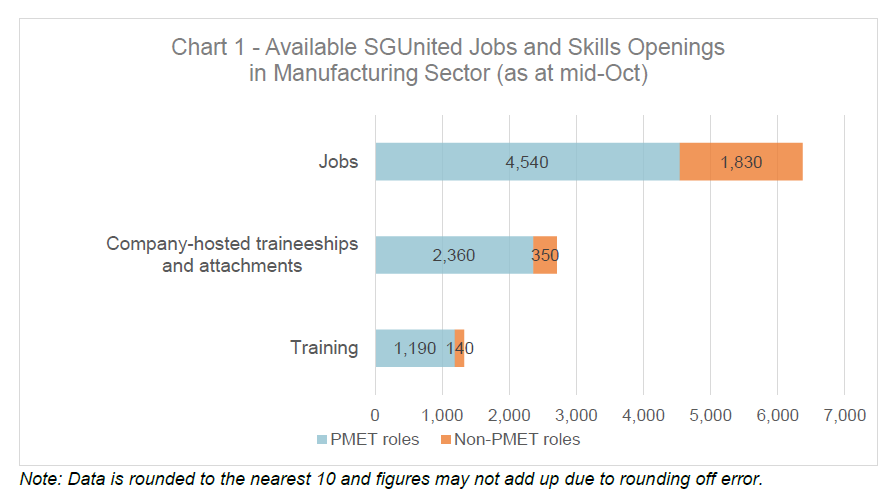
- Electronics (2,060), Precision Engineering (1,910), and Food Manufacturing (1,440) had the greatest number of available openings (refer to Chart 2).
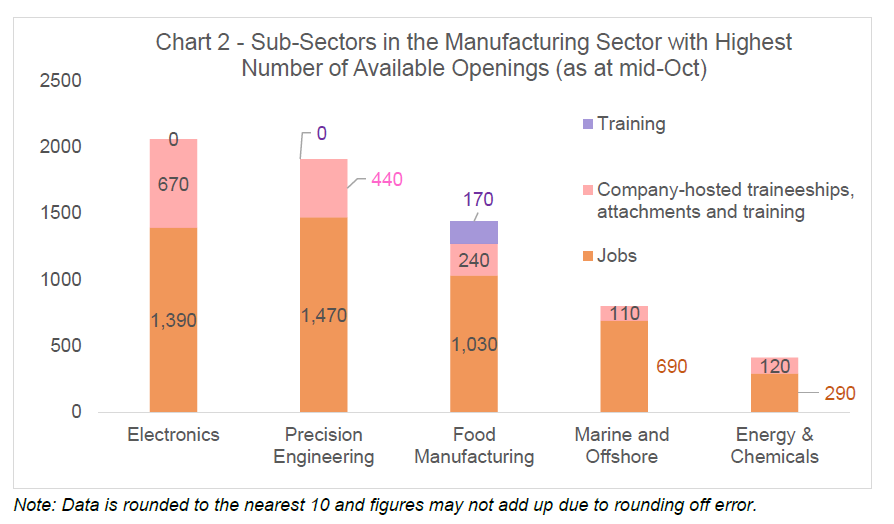
- The top roles within the sub-sectors are:
- PMETs: Manufacturing Engineering Technicians, Electronics Engineers, Software, Web and Multimedia Developers and Mechanical Engineers. Median salaries range from $1,700 to $6,000 (refer to Chart 3).
- Non-PMETs: Production Clerks, Welders and Flame Cutters and Machine-Tool Setters-Operators. Median salaries range from $1,300 to $2,500 (refer to Chart 4).
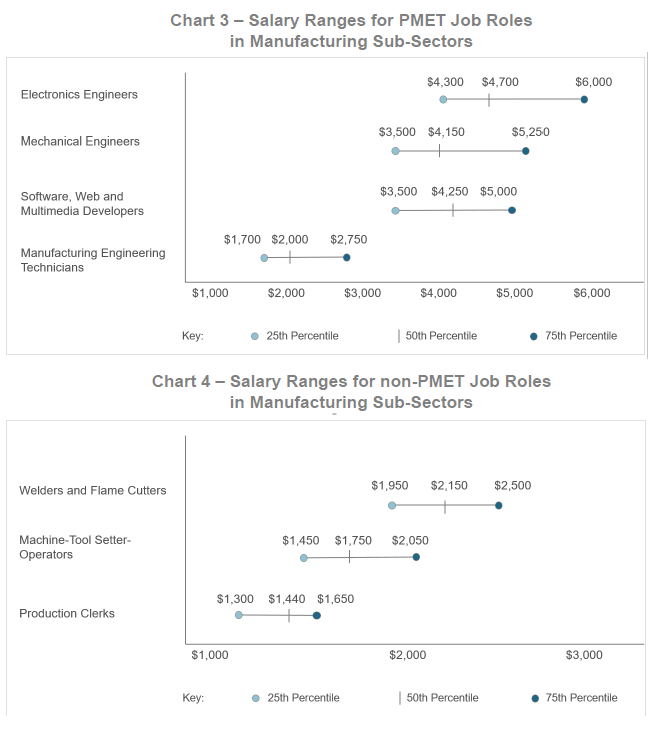
- The number of individuals who entered the Manufacturing sector through the various initiatives under the SGUnited Jobs and Skills Package nearly tripled from end-Jun (730) to mid-Oct (2,120) (refer to Chart 5).
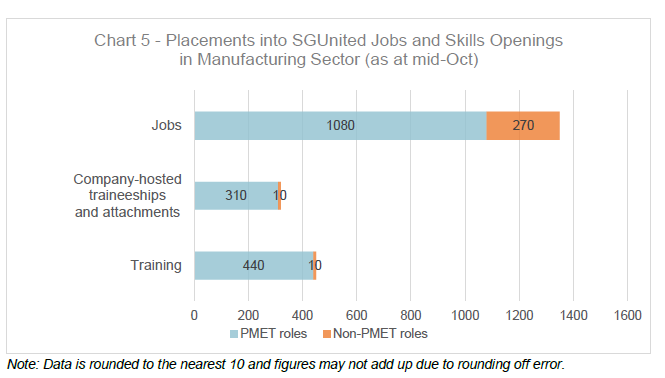
Effects of COVID-19 on the Marine and Offshore Sub-Sector
- Singapore provides services to meet the worldwide demand for ship repair, shipbuilding, rig-building and offshore engineering, as well as oilfield equipment manufacturing, and the building and chartering of offshore supply vessels.
- The sub-sector employs close to 77,000 workers.
- The ecosystem, anchored by the three Large Local Enterprises – Keppel Offshore & Marine, Sembcorp Marine and ST Engineering Marine – is well supported by a network of SMEs that supplies the yards with manpower.
- The Marine and Offshore sub-sector has been hard hit in recent years, due largely to weakened rig demand resulting from the slump in global oil prices. Moreover, because of the COVID-19 pandemic, companies had to stop non-essential work or operate at reduced capacities to comply with movement restriction and safe management measures. This has led to a decline in contracting activities and delays in deliveries of new vessels.
- To position the Marine and Offshore sub-sector for recovery, the government extended the Enhanced Training Support Package to encourage companies to upskill their workers during this downtime.
- Employers who send their employees for sector-specific training programmes from Oct 2020 to Jun 2021, will receive course fee subsidies of up to 90%.
- Skills covered include electrical power engineering, LNG bunkering, shipyard safety, automation and robotics, cybersecurity and digital transformation.
- Despite the challenges faced, the sub-sector remains committed to pivoting to longer-term growth opportunities, such as:
- Liquefied Natural Gas (LNG), offshore wind and sustainable energy-related projects;
- Advanced manufacturing capabilities to improve yard productivity; and the
- Growing niche cruise ship building and refurbishment market
- Jobseekers and workers can look forward to taking on new and higher-value job roles created as a result of Marine and Offshore’s ongoing transformation efforts:
- Automation engineers to integrate automated technologies and robotic systems in ships and rigs;
- Data scientists to conduct analysis and validation to improve ship, rig, marine equipment design and refine maintenance schedule; and
- Process engineers to optimise engineering systems and operations for the businesses.
- Workers may also wish to pick up the following skills to support the sub-sector’s shifts to new growth areas, and to continue thriving in their careers:
- Marine Engineering skills to design, build and integrate automated technologies and robotic systems in ships, rigs or conversions manufacturing
- Systems Engineering skills to integrate computerised systems and equipment onboard ships and rigs to communication through data transmission.
- Green Shipping skills to enable ecological friendliness in ship designs and production processes through alternative fuel (e.g. LNG), enhancing fuel efficiency and reducing waste.
- Rapid Prototyping skills to build prototypes and products using 3-dimensional rapid prototyping and addictive manufacturing technology.
- Big Data Analytics to discover trends to improve ship, rig, conversion and/or marine equipment design and refine condition-based maintenance schedules.
- In the past four years, companies have been tapping on Workforce Singapore’s (WSG) Redeployment Professional Conversion Programme (PCP), to equip their workers with these new skillsets, so that they can take on new or enhanced roles, and better support their employers’ move into the new growth areas.
- These include roles such as Project Manager/Engineer, who typically manage LNG-related projects; Mechanical Engineers; and Commissioning Engineer, a shift from production work to testing of systems and equipment.
- Many of these workers have continued to extend their career runway.
- One of them is 38-year-old Steven Lee. The mechanical engineering graduate joined Sembcorp Marine (SCM) as an Assistant Engineer in 2003 and worked his way up the ranks to Engineer, Engineering Design (Machinery).
- Steven and his colleagues were enrolled in a structured six-month redeployment PCP for Marine Engineer in 2018. As part of the training, Steven was given the opportunity to be posted overseas to learn from experts in gas-related technologies and solutions.
- With the newly acquired skills and knowledge, Steven was able to assimilate into his new role confidently. In his new role, Steven leads the development of detailed mechanical process design, topside mechanical systems solutions and mechanical completion to support the construction and commissioning of Floating Production Storage and Offloading/LNG projects.
- Two years on, Steven continues to advance in his career in the new growth area with SCM. He was promoted to Assistant Manager, Engineering Design, and continues to enjoy his work.
- Besides assisting with redeployment efforts, WSG is also helping companies in the Marine sub-sectors take in workers with relevant skillsets from other sectors such as Aerospace and Air Transport through the SGUnited Jobs Initiative.
- To build their future manpower pipeline, companies such as Sembcorp Marine Integrated Yard, Keppel Shipyard, Keppel FELS, ST Engineering Marine and Excel Marco, are participating in the SGUnited Traineeships and Mid-Career Pathways Programmes to train fresh/recent graduates and mid-career individuals.
SGUnited Jobs and Skills Openings in the Marine and Offshore Sub-sector
- While the Marine and Offshore sector has been shedding workers in recent years, most of the affected workers came from companies in oil and gas equipment manufacturing. During this period, hiring continued among companies in marine activities such as ship repair, conversion, and refurbishment.
- As at mid-Oct, there remain 800 available openings in the Marine and Offshore sub-sector.
- Around 87% are jobs (see Chart 6).
- Companies such as ICF International Pte Ltd continue to hire.
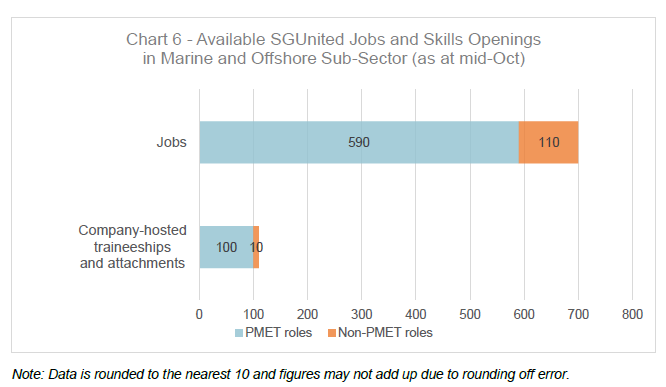
- Marine and Offshore require highly skilled manpower.
- About 84% of job openings are in PMET roles such as Process Automation Engineers, Engineers (Environmental Engineering), Design Engineers, Automation Engineers, Electrical Engineers, Mechanical Engineering Technicians and Manufacturing Engineering Technicians.
- Salaries offered range from $2,000 to $7,500, depending on the job requirements and the candidate’s skillsets (refer to Chart 7).

- Mid-career jobseekers with electrical, mechanical engineering or related backgrounds tend to find it easier to switch into the Marine and Offshore sector, as they already possessed the transferrable skills needed to handle complex projects.
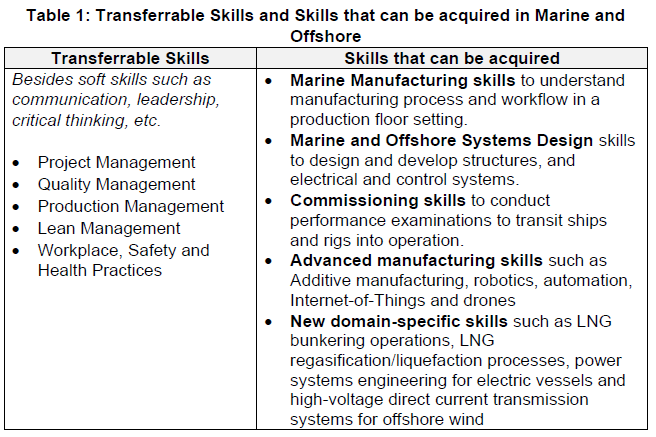
- To support more mid-career individuals, WSG offers the following PCPs that help lower the barriers to entry and ease their transition:
- PCP for Marine Engineer to take on roles such as Process Engineer, Project Engineer/Manager, Environmental Engineer, Automation Engineer and Costing Engineer.
- PCP for Marine Assistant Engineer to take on roles such as Assistant Project Engineer, Assistant Engineer (Design), and Procurement Executive/Officer
- PCP for Marine Technician to take on roles such as Quality Assurance Inspector, Technician (Mechanical, Electrical) and Health, Safety & Environment Coordinator.
- 39-year-old George Wee is one of the beneficiaries.
- Upon referral from his friend, the former Technical Sales Executive in precision engineering pursued a new career in the cruise ship refurbishment segment in Marine and Offshore, joining ICF International Pte Ltd as an Assistant Manager, Production (Marine and Offshore Engineering) in Sep 2018.
- To ease his transition and plug his skills gaps related to cruise ship marine interior fitouts, ICF International enrolled him in the PCP for Marine Engineer.
- Two years on, George remains committed to the company and optimistic about its prospects. Despite the challenges posed by COVID-19, ICF International continued to secure contracts including enhancing medical centre onboard cruise ship as part of COVID-19 pandemic healthcare measures put in place.
- George urges mid-career individuals like him to keep an open mind about their options and not be afraid to unlearn and relearn.
- Between April to mid-Oct 2020, over 70 individuals have been placed into jobs, and company-hosted traineeships and attachments in the Marine and Offshore sub-sector.
- This includes close to 30 mid-career individuals who have made the switch into the sub-sector through the PCPs.
- Others have enrolled in traineeships in roles such as Project Management Engineer, Design Engineer, Production Engineer, Automation Process Engineer, Lean Specialist and Environmental Engineer since June.
- One of them is 25-year-old Loh Wei Hao, who joined Excel Marco Industrial Systems Pte Ltd as an Automation Hardware Design Engineer in Sep 2020.
- Being realistic about his options amid the current job market, the Naval Architecture graduate decided to be open to various pathways, including traineeships, as he wanted to use this time to pick up new skills and gain real-world experience.
- He eventually landed the offer to join Excel Marco Industrial Systems Pte Ltd, an SME that specialises in process automation and safety systems for Marine and Offshore in Sep 2020.
- As an Automation Hardware Design Engineer trainee, Wei Hao will gain technical competencies and be exposed to the full project life cycle in the design, development and execution of process automation systems.
- Almost two months into his traineeship, Wei Hao enjoys his time with the company and aspires to become a Technical Specialist for Process Automation and Safety Systems in the near future. He remains optimistic that the sector will recover and continue to grow as it pivots to new areas.
For more information
- To find out more about:
- Immediate job opportunities in the Marine and Offshore sub-sector under the SGUnited Jobs and Skills Package, please visit https://go.gov.sg/mcfmarine.
- WSG’s programmes and career advisory and matching services, please visit www.mycareersfuture.gov.sg/careercoaching (QR code below) or call WSG’s hotline at 6883 5885.
- SSG’s SGUnited Skills programmes, jobseekers can visit https://www.myskillsfuture.sg/sgunitedskills.
- SSG’s Skills and Training Advisory services, jobseekers can visit https://www.myskillsfuture.sg/content/portal/en/career-resources/career-resources/education-career-personal-development/skills-training-advice.html
- Upcoming engagement and outreach events organised by NTUC’s e2i and WSG, jobseekers can visit https://www.ssg-wsg.gov.sg/events.html or https://e2i.com.sg/events/. The list of events for the month of Nov 2020 can also be found in Annex B.